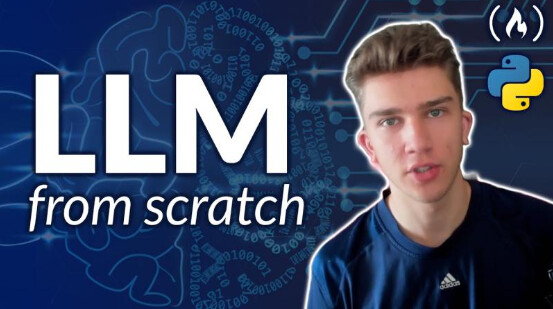Learn how to build your own large language model, from scratch.
This course goes into the data handling, math, and transformers behind large language models.
You will use Python.

Contents:
(0:00:00) Intro
(0:03:25) Install Libraries
(0:06:24) Pylzma build tools
(0:08:58) Jupyter Notebook
(0:12:11) Download wizard of oz
(0:14:51) Experimenting with text file
(0:17:58) Character-level tokenizer
(0:19:44) Types of tokenizers
(0:20:58) Tensors instead of Arrays
(0:22:37) Linear Algebra heads up
(0:23:29) Train and validation splits
(0:25:30) Premise of Bigram Model
(0:26:41) Inputs and Targets
(0:29:29) Inputs and Targets Implementation
(0:30:10) Batch size hyperparameter
(0:32:13) Switching from CPU to CUDA
(0:33:28) PyTorch Overview
(0:42:49) CPU vs GPU performance in PyTorch
(0:47:49) More PyTorch Functions
(1:06:03) Embedding Vectors
(1:11:33) Embedding Implementation
(1:13:06) Dot Product and Matrix Multiplication
(1:25:42) Matmul Implementation
(1:26:56) Int vs Float
(1:29:52) Recap and get_batch
(1:35:07) nnModule subclass
(1:37:05) Gradient Descent
(1:50:53) Logits and Reshaping
(1:59:28) Generate function and giving the model some context
(2:03:58) Logits Dimensionality
(2:05:17) Training loop + Optimizer + Zerograd explanation
(2:13:56) Optimizers Overview
(2:17:04) Applications of Optimizers
(2:18:11) Loss reporting + Train VS Eval mode
(2:32:54) Normalization Overview
(2:35:45) ReLU, Sigmoid, Tanh Activations
(2:45:15) Transformer and Self-Attention
(2:46:55) Transformer Architecture
(3:17:54) Building a GPT, not Transformer model
(3:19:46) Self-Attention Deep Dive
(3:25:05) GPT architecture
(3:27:07) Switching to Macbook
(3:31:42) Implementing Positional Encoding
(3:36:57) GPTLanguageModel initalization
(3:40:52) GPTLanguageModel forward pass
(3:46:56) Standard Deviation for model parameters
(4:00:50) Transformer Blocks
(4:04:54) FeedForward network
(4:07:53) Multi-head Attention
(4:12:49) Dot product attention
(4:19:43) Why we scale by 1/sqrt(dk)
(4:26:45) Sequential VS ModuleList Processing
(4:30:47) Overview Hyperparameters
(4:32:14) Fixing errors, refining
(4:34:01) Begin training
(4:35:46) OpenWebText download and Survey of LLMs paper
(4:37:56) How the dataloader/batch getter will have to change
(4:41:20) Extract corpus with winrar
(4:43:44) Python data extractor
(4:49:23) Adjusting for train and val splits
(4:57:55) Adding dataloader
(4:59:04) Training on OpenWebText
(5:02:22) Training works well, model loading/saving
(5:04:18) Pickling
(5:05:32) Fixing errors + GPU Memory in task manager
(5:14:05) Command line argument parsing
(5:18:11) Porting code to script
(5:22:04) Prompt: Completion feature + more errors
(5:24:23) nnModule inheritance + generation cropping
(5:27:54) Pretraining vs Finetuning
(5:33:07) R&D pointers
(5:44:38) Outro
![]() Course developed by @elliotarledge
Course developed by @elliotarledge
![]() Code and course resources: GitHub - Infatoshi/fcc-intro-to-llms Join Elliot’s
Code and course resources: GitHub - Infatoshi/fcc-intro-to-llms Join Elliot’s